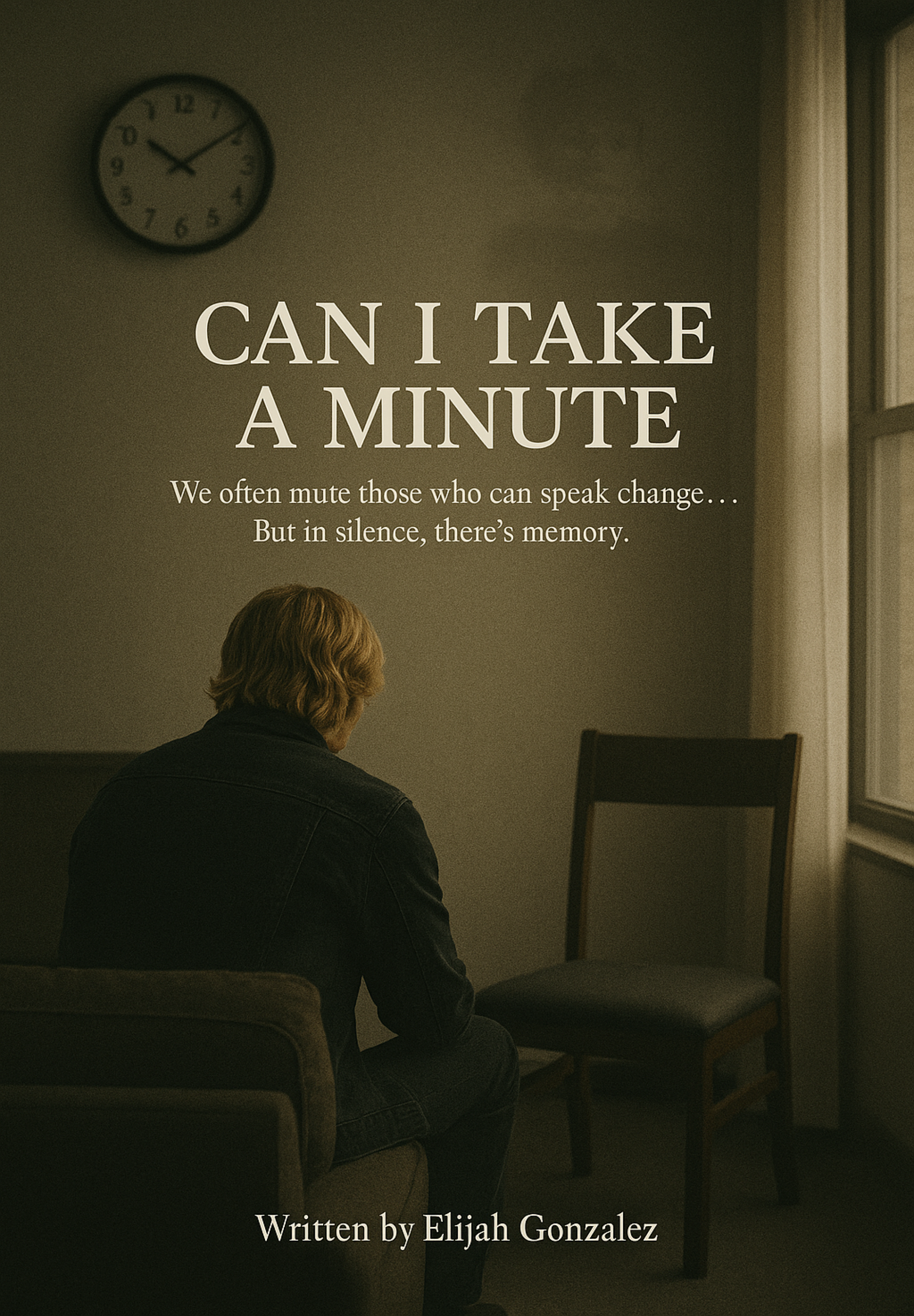
Synopsis/Details
Can I Take a Minute is a surreal psychological drama about fractured identity, suppressed trauma, and the disorienting grief of surviving yourself. At its center is Jacob, a 20-year-old man who, after a failed suicide attempt, enters a dissociative state in which he unknowingly assumes the identity of his younger brother, Danny. The film unfolds as a descent into Jacob’s subconscious, where memory and identity begin to collapse in on each other.
The story begins in a stark therapy room. It’s not a place for dialogue—it responds through subtle vibrations, low hums that seem to listen more than speak. Jacob arrives each session believing he is Danny, mourning a brother he no longer understands as separate. What starts as a quiet grief narrative slowly evolves into something more haunting. The therapy room is not just a setting—it’s an emotional barometer, shifting with Jacob’s internal unraveling.
As Jacob opens up, he revisits memories of a volatile upbringing: a neglectful mother, isolated childhood moments, and flashes of closeness with his brother that never quite feel whole. The room pulses in response—lights flicker, space distorts, and familiar memories begin to bend. Time slips. Events replay in altered form. His brother appears in reflections, but never fully present. A specific hour—3:19 a.m.—echoes throughout: on clocks, in blood, in nightmares. It becomes the fixed moment when everything splintered.
Outside of therapy, Jacob drifts through a hollow version of life. He moves through buses, alleyways, and stairwells in a loop that feels more remembered than lived. There’s no one else—no connection, no dialogue, just repetition. Reality offers no anchor. Everything feels constructed, like it exists only because he insists it must.
Each session inside the therapy room pulls “Danny” deeper into something fragile and fragmented. He remembers childhood moments with his brother: listening to music, making popcorn, hiding from their mother’s rage. But the memories feel warped—sometimes too vivid, sometimes missing entirely. Details shift. Faces blur. And through it all, the room hums with something just out of reach, as if it already knows what Jacob is still unwilling to admit.
The vibrations begin to change—no longer neutral, but reactive. They comfort him one moment, confront him the next. When he recounts a seemingly happy memory with his brother, the atmosphere tightens. The hum grows louder. The lights change. The room knows what Jacob doesn’t: that he’s lying to himself.
Outside the sessions, the world stays dreamlike and disconnected. Jacob (as Danny) moves on autopilot—bus rides, stairwells, convenience stores—but no one talks to him. No one really sees him. Even the environment repeats, like memories looping out of order. The bathroom is the only place that feels real—yet it shifts violently. Sometimes it’s pristine. Other times, it’s drenched in blood. Sometimes the mirror reflects Danny. Sometimes, someone else entirely. Always, the clock reads 3:19 a.m.—a time burned into the very structure of his mind.
As the therapy deepens, the room becomes unpredictable. It stretches. Contracts. Flickers between locations—childhood bedrooms, stairwells, bathtubs. It doesn’t want to hear Jacob’s version of grief. It wants him to see something he’s refused to face. But he clings to the identity of Danny, convinced he’s the one who was left behind.
Then the memories start to overlap. Jacob experiences the same moment from multiple angles. He sees himself as both brothers. He witnesses his own hand trembling. The weight of a gun. The sound of a mirror cracking. Blood on tile. But even in these flashes, he refuses to name the truth.
One night, the vibrations stop entirely. The room is silent. And in that stillness, the therapist—previously absent, blurred, or distorted—steps forward. She is clear now. Human. Calm. Present. And she hands Jacob a mirror.
It’s the final scene.
He looks.
For the first time—truly—he sees himself.
Scarred. Older. Broken. Alive.
He is not Danny. He never was.
And the illusion collapses.
It’s not healing. It’s recognition. He doesn’t speak. He doesn’t need to. The silence stretches as he stares into his own reflection—seeing, at last, the face of someone who tried to disappear and failed.
And then the film ends.
There is no embrace. No dramatic score. No clean recovery. Only Jacob—still inside the therapy room, but no longer hiding—facing the unbearable truth he’s buried for years.
Can I Take a Minute is not a redemption story. It’s not about fixing what’s broken. It’s about naming it. Sitting with it. Letting it be real. It explores the aftermath of trauma not through exposition or plot twists, but through tone, silence, and repetition. Dialogue is minimal. Emotion is carried through visuals, sound design, and atmosphere.
The structure mirrors Jacob’s fractured mind—nonlinear, looping, often collapsing under its own weight. Key motifs recur throughout: the mirror, the clock stuck at 3:19 a.m., the shifting bathroom, and the vibrations that pulse with unspoken feeling. The therapy room itself becomes a living metaphor—part memory, part subconscious, part purgatory.
By the end, the viewer is not granted catharsis. Only clarity. Jacob has not escaped the darkness. But he’s no longer pretending it isn’t there.
This is a film for anyone who has buried their pain so deep they forgot it had a shape. A film about what happens when denial dies. It’s not about death. It’s about what remains—and what it takes to face it.
All Accolades & Coverage
currently submitted in the big break writers competition
Story & Logistics
Story Type:
Escape
Story Situation:
Madness
Story Conclusion:
Tragic
Linear Structure:
Non-linear
Moral Affections:
Innocence
Cast Size:
Few
Locations:
Couple
Special Effects:
Other on-set effects, Prosthetics
Characters
Lead Role Ages:
Female Middle Aged, Male Teenager, Male Young Adult, Male under 13
Stock Character Types:
Outlaw
Advanced
Subgenre:
Rape, Survival, Suspense-Thriller
Equality & Diversity:
Disability Focused
Life Topics:
Adolescence, Approaching Death, Death, Near Death Experience
Drug Topics:
Legal Drugs
Time Period:
The Social Age (2004–present)
Country:
United States of America (USA)
Time of Year:
Valentine’s Day
Illness Topics:
Psychological
Relationship Topics:
Abusive relationship
Writer Style:
Charlie Kaufman
